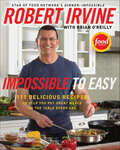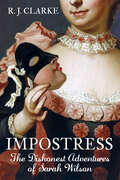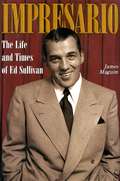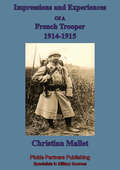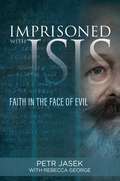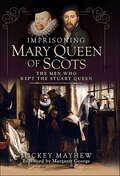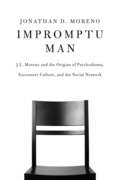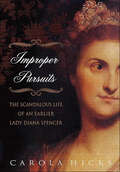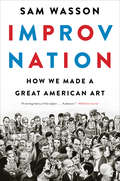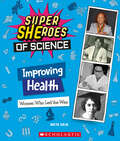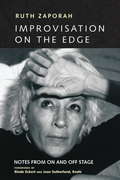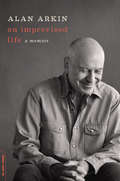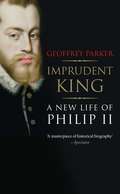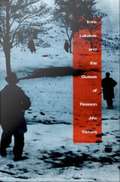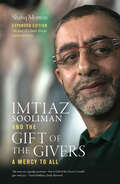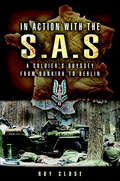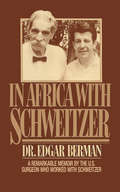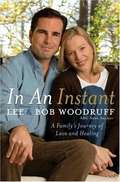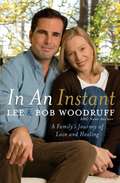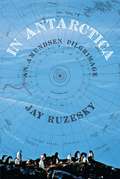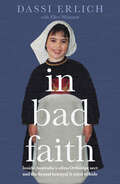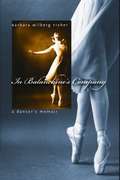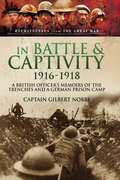- Table View
- List View
Impossible to Easy: 111 Delicious Recipes to Help You Put Great Meals on the Table Every Day
by Robert Irvine Brian O'ReillyThe host of Food Network's Dinner: Impossible shows busy people how to keep food simple but deliciousChef Robert Irvine goes where few chefs dare. As the host of Food Network's Dinner: Impossible, he has cooked on a desert island, in an eighteenth-century kitchen, inside an ice hotel, and even for cowpunchers on a cattle drive. In Impossible to Easy, he converts the classical and improvisational kitchen skills he's learned during the past twenty-five years under some of the most challenging conditions into advice to help the home cook achieve mastery in his or her own kitchen.Irvine shows how to approach ingredients in new and familiar ways, how to plan and execute delicious meals every time, and how to guarantee maximum flavor from every dish. By establishing a few simple organizational, shopping, and storage habits, home cooks can not only get the most out of fresh foods and spices but elevate their everyday meals to a higher level of accomplishment and enjoyment. Here, too, is advice on useful equipment and implements, pantry staples, do-ahead tips, and 111 easy-to-master recipes (many complete with timelines, and half of which are gluten free) that are sure to keep family and friends coming back for more. By separating each process into its constituent parts, anyone can easily create such tasty dishes as Lime-Cured Shrimp and Roasted Corn Chowder, Porcini-Dusted Pork Chops with Cremini Mushrooms and Golden Raisins over Horseradish-Scented Potatoes, Pommes Frites with Chipotle Aioli, Duck Confit with Three-Bean Cassoulet, Windy City Stovetop Pizza, Braised Asian Pear with Roquefort and Sweet Port Wine Dressing, Banana Chocolate-Hazelnut Crepes, and dozens more right in his or her own home.
Impostress: The Dishonest Adventures of Sarah Wilson
by R. J. Clarke"Her story is adapted to move the compassion of those she visits. She has bad nerves, and seems in great disorder of mind, which she pretends to be owing to the ill usage of her father […] She attempts to borrow money of [sic] waiters, servants, and chaise boys, and offers to leave something in pawn with them to the value. Her name is supposed to be Sarah Wilson." - London Evening-Post, 30 October 1766Beginning in her late teens, Sarah Wilson travelled alone all over England, living on her wits, inventing new identities, and embroidering stories to fool her victims into providing money and fine clothes. When her crimes eventually caught up with her, she was transported to America – where she reinvented herself in the guise of the Queen’s sister and began a new set of adventures at the onset of the American War of Independence. Using original research, newspaper reports and court records, this is the story of ‘the greatest Impostress of the present Age’: a real-life Moll Flanders who created a remarkable series of lives for herself on both sides of the Atlantic.
Impresario: The Life and Times of Ed Sullivan
by James MaguireEd Sullivan has nearly 100% name recognition among people 40 and older. In a survey of the fifty most influential programs in the U.S., TV Guide ranked The Ed Sullivan Show #10. The show still appears on PBS and on cable stations across the country. Sixty million baby boomers grew up watching The Ed Sullivan Show. For more than twenty years, from 1948 to 1971, fifty-five million viewers watched The Ed Sullivan Show religiously every Sunday night. Everyone who was anyone appeared--the Beatles and Elvis, of course, and Woody Allen, Bill Cosby, and Elizabeth Taylor, plus public figures such as Fidel Castro, David Ben-Gurion, and Martin Luther King, Jr. More than thirty years later, the program remains a pop-culture icon. But despite Ed Sullivan's prominence, little was known about the private man...until now. Impresario reveals what the Sullivan viewers never saw: nasty, hot-tempered, craven, yet also capable of high ideals and, above all, hugely ambitious. At a time when Americans are looking back, The Ed Sullivan Show stands out as a shining example of television during the golden era. Impresario lets readers look behind the screen to see the man who made it happen.
Impressions and Experiences of A French Trooper, 1914-1915
by Anon Christian MalletThe 22nd French Dragoons have a long and glorious history on the field of battle since 1630 to the Napoleonic battlefield of Austerlitz, Eylau, Jena it was called again to duty in the First World War, one of its members trooper Christian Mellet recorded his experiences in and out of the saddle.At the initial onrush of the French armies into Belgium to get to grips with the enemy Mallet and his regiment trotted out to war from Rheims in Northern France. The French forces in the Vosges and Alsace attacked en masse and were slaughtered whilst the cavalry that Mallet was a member fell back before stronger German forces. Fortunes swung back to the Allies side and as the Allies fought the battle of the Marne; Mallet, in the thick of it, remembers that he and his fellow troopers were exhausted and "covered with a layer of black dust adherent from sweat, looked like devils". Mallet and his comrades then faced the war on foot as the chance to use mounted troops gave way to the advent of trenches; he fought on bravely until an attack at Loos where as Mallet recalls "we entered the zone of Hell.". The Author by now a junior officer had the responsibility of leading his men, but suddenly felt "a brutal blow in the back with the butt-end of a rifle" but it was actually a vicious shell fragment that tore into his back. Mallet kept his men fighting for the time being until relief could arrive but was thereafter honourably discharged from the Army due to his wounds.Few memoirs of the French cavalry still exist and fewer still have been translated into English making this both rare and compelling. Mallet writes in an easy style which is filled with anecdotes on the march or out of the line and vivid vignettes of the fighting which appeared as a blur to him amidst the shot and shells.
Imprisoned with ISIS: Faith in the Face of Evil
by Petr JasekAs a child, Petr Jasek (Peter Yash-eck) watched Soviet tanks roll through the streets of his village in Czechoslovakia, taking the country by force and subjecting it to decades of Communist oppression. Petr grew up in the underground church and benefitted from financial help and Bibles smuggled in to his family. As an adult living in the free Czech Republic, Petr chose to begin serving persecuted Christians—especially in Islamist hotspots in Africa and the Middle East. In 2015, he was arrested in Sudan, convicted as an enemy of the state, and sentenced to life in prison, where he was forced to share a group cell with ISIS terrorists. The true story of what God did in and through Petr has already inspired tens of thousands around the world. Now, for the first time, Petr tells the whole story.
Imprisoning Mary Queen of Scots: The Men Who Kept the Stuart Queen
by Mickey MayhewImprisoning Mary Queen of Scots covers the lives and careers of the men and women who ‘kept’ Mary Queen of Scots when she was a political prisoner in England, circa 1568/9-1587. Mary’s troubled claim to the English throne - much to the consternation of her ‘dear cousin’ Elizabeth I - made her a mortal enemy of the aforementioned Virgin Queen and set them on a collision course from which only one would walk away. Mary’s calamitous personal life, encompassing assassinations, kidnaps and abdications, sent her careering into England and right into the lap of Henry VIII’s shrewd but insecure daughter. Having no choice but keep Mary under lock and key, Elizabeth trusted this onerous task to some of the most capable - not to mention the richest - men and women in England; Sir Francis Knollys, Rafe Sadler (of Wolf Hall fame), the Earl of Shrewsbury and his wife, Bess of Hardwick, and finally, the puritanical nit-picker Sir Amyas Paulet. Until now, these nobles have been mere bit-players in Mary’s story; now, their own lives, loves and fortunes are laid bare for all to see. From Carlisle Castle to Fotheringay, these men and women all but bankrupted themselves in keeping the deposed Scots queen in the style to which she was accustomed, while fending off countless escape plots of which Mary herself was often the author. With the sort of twist that history excels at, it was in fact a honeytrap escape plot set up by Elizabeth’s ministers that finally saw Mary brought to the executioner’s block, but what of the lives of the gaolers who had until then acted as her guardian? This book explains how Shrewsbury and Bess saw their marriage wrecked by Mary’s legendary charms, and how Sir Amyas Paulet ended up making a guest appearance on ‘Most Haunted’, some several hundred years after his death. In that theme, the book also covers the appearances of these men and women on film and TV, in novels and also the various other Mary-related media that help keep simmering the legend of this most misunderstood of monarchs.
Impromptu Man
by Jonathan D. Moreno"Impromptu Man captures the remarkable impact of a singular genius, J.L. Moreno, whose creations-the best-known being psychodrama-have shaped our culture in myriad ways, many unrecognized. The record will be set straight for all time by this can't-put-down biography, a tribute by Jonathan D. Moreno to his father's masterly legacy." -DANIEL GOLEMAN, author of Emotional Intelligence: Why It Can Matter More Than IQJ.L. Moreno (1889-1974), the father of psychodrama, was an early critic of Sigmund Freud, wrote landmark works of Viennese expressionism, founded an experimental theater where he discovered Peter Lorre, influenced Martin Buber, and became one of the most important psychiatrists and social scientists of his time. ??A mystic, theater impresario and inventor in his youth, Moreno immigrated to America in 1926, where he trained famous actors, introduced group therapy, and was a forerunner of humanistic psychology. As a social reformer, he reorganized schools and prisons, and designed New Deal planned communities for workers and farmers. Moreno's methods have been adopted by improvisational theater groups, military organizations, educators, business leaders, and trial lawyers. His studies of social networks laid the groundwork for social media like Twitter and Facebook. ??Featuring interviews with Clay Shirky, Gloria Steinem, and Werner Erhard, among others, original documentary research, and the author's own perspective growing up as the son of an innovative genius, Impromptu Man is both the study of a great and largely unsung figure of the last century and an epic history, taking readers from the creative chaos of early twentieth-century Vienna to the wired world of Silicon Valley.Jonathan D. Moreno, called the "most interesting bioethicist of our time" by the American Journal of Bioethics, is a professor at the University of Pennsylvania and a Senior Fellow at the Center for American Progress.
Improper Pursuits: The Scandalous Life of an Earlier Lady Diana Spencer
by Carola HicksWith these words to Boswell, Samuel Johnson dismissed Lady Di Beauclerk, the wife of one of his closest friends, a woman of the highest rank, the daughter of a duke, who had forsaken her reputation, her place in society, her children, and her role as lady-in-waiting to the Queen for love.Born Lady Diana Spencer in 1735, the eldest child of the third Duke of Marlborough, she was expected rigidly to follow a traditional path through life: educated in the fashion considered suitable for a girl, and married to a man of the appropriate rank for a duke's daughter. But finding herself in a desperately unhappy marriage to Viscount Bolingbroke, Lady Di overturned convention. She left her husband, maintained a secret relationship with her lover, Topham Beauclerk, hid the birth of an illegitimate child, and eventually helped to support herself by painting.Lady Di Beauclerk was a highly gifted artist who was able to use her scandalous reputation as an adulteress, aristocratic woman to further her career as a painter and designer. She painted portraits, illustrated plays and books, provided designs for Wedgwood's innovative pottery, and decorated rooms with murals. Championed by her close friend Horace Walpole, whose letters illuminate all aspects of her life, she was able to establish herself as an admired artist at a time when women struggled to forge careers.Carola Hicks provides an enthralling account of eighteenth-century society, in which Lady Di encountered many of the most eminent artistic, literary, and political figures of the day. Improper Pursuits is an absorbing study of a singular life.
Improv Nation: How We Made a Great American Art
by Sam WassonA finalist for the 2017 George Freedley Memorial Award &“A compelling, absolutely unputdownable story . . . And, in case you&’re wondering, yes, the book is funny. In places, very funny. A remarkable story, magnificently told.&” — Booklist In this richly reported, scene-driven narrative, Sam Wasson charts the meteoric rise of improv from its unlikely beginnings in McCarthy-era Chicago. We witness the chance meeting between Mike Nichols and Elaine May, hang out at the after-hours bar where Dan Aykroyd hosted friends like John Belushi, Bill Murray, and Gilda Radner, and go behind the scenes of cultural landmarks from The Graduate to The Colbert Report. Along the way, we befriend pioneers such as Harold Ramis, Chevy Chase, Steve Carell, Amy Poehler, Alan Arkin, Tina Fey, Judd Apatow, and many others. Wasson shows why improv deserves to be considered the great American art form of the last half century. &“One of the most important stories in American popular culture . . . Wasson may be the first author to explain [improv&’s] entire history . . . For that reason alone, it&’s a valuable book.&” — New York Times Book Review &“A compelling history . . . It holds the element of surprise—true to the spirit of its subject.&” — Entertainment Weekly
Improving Health: Women Who Led the Way (Super SHEroes of Science) (Super SHEroes of Science)
by Anita DalalThis brand-new series highlights some of the major contributions women have made in the world of science.Women have historically been associated with caring for the sick, but their role in health sciences goes far beyond their traditional role. Women played a leading role in placing hygiene and nursing on a scientific footing. They have also advanced surgical techniques, developed cures for killer diseases, learned about human anatomy, and figured out the chemistry behind some of the biochemicals on which humans depend for their health. This book tells their stories and describes their vital contributions.
Improvisation On the Edge
by Rinde Eckert Joan Sunderland Ruth ZaporahDirected not only toward actors, dancers, and other performing artists who draw upon improvisation as part of their craft, this Zen-infused memoir of a life lived creatively will pique the interest of anyone in search of liberation from self-limiting concepts. What does it mean to live in a body? What does it mean to improvise? Do we wonder whether we're capable of improvising--to make up things as we go, step into the unknown, take a risk that changes our notion of ourselves and the world? Author Ruth Zaporah has been a professional physical theater performer, writer, director, and teacher for forty years. Early on she realized that with a shift of perception, every moment of an improvisation holds both the familiar and the utterly new. With the same shift, so does every moment of life; every moment holds both the known and the unknown. And, as Zaporah says, "The body leads the way in this book. In each chapter the world is experienced by it and of it. It is the body that adds richness, wildness, and grace. The body invokes images and feelings. It is the body that imagines." Improvisation on the Edge recounts events from Zaporah's life such as improvisational shows in the war zones of Sarajevo and Kosovo; apprenticing with a Huichol medicine woman from Chiapas, Mexico; understanding the concept of "practice" while on a beach; a bus ride in Cuba; a car ride in Estonia; the intricacies of onstage collaborations. Interspersed are chapters about awareness, listening, adapting, resiliency, time, space, silence, simplicity--all within the context of everyday life in the body. In several other chapters, Ruth writes from the logical (and nonlinear) voice of the improviser as she is on stage, within the immediate embodied process. A fascinating glimpse into the mind of an artist and true master of improvisation, this book will appeal to performers, teachers, and anyone who has ever needed to "wing it" with confidence and grace. Table of Contents 1. Something That Needs Listening To 2. Mirror Mirror 3. On My Wall 4. Tutu Solitude 5. A Mind in Three Episodes 6. A Splish Splash Orchestra 7. A Take on Talk 8. Bobby's River 9. Roar 10. Meet Yourself Babe 11. Nuts and Bolts 12. Out of Chaos 13. Changing Course 14. The Flying Shaman 15. You Could Say Death 16. Ain't It The Truth 17. The Raging Boomerang 18. See This Feel That 19. Stalking War 20. Your Mother Just Died Christina, Leave the Backdoor Open 21. The Illusive Genture 22. A Pack of Lies 23. Again Gun and Boys 24. A Ride in Estonia 25. Art and Heart 26. Floating to the Surface 27. Stuffed With Junk 28. A Chair in Cuba 29. Any Where Practice 30 Teacher Says 31. Older and Under
Improvised Life: A Memoir
by Alan ArkinAlan Arkin, who began acting lessons at age 10 and whose first major film role won him an Academy Award offers a memoir of his acting career. In addition to acting, he also excelled in directing, writing, and as a musician. Arkin takes readers along on a journey through his career and the discoveries he made about acting and life along the way. Annotation ©2011 Book News, Inc. , Portland, OR (booknews. com)
Imprudent King
by Geoffrey ParkerPhilip II is not only the most famous king in Spanish history, but one of the most famous monarchs in English history: the man who married Mary Tudor and later launched the Spanish Armada against her sister Elizabeth I. This compelling biography of the most powerful European monarch of his day begins with his conception (1526) and ends with his ascent to Paradise (1603), two occurrences surprisingly well documented by contemporaries. Eminent historian Geoffrey Parker draws on four decades of research on Philip as well as a recent, extraordinary archival discovery#151;a trove of 3,000 documents in the vaults of the Hispanic Society of America in New York City, unread since crossing Philip’s own desk more than four centuries ago. Many of them change significantly what we know about the king. The book examines Philip’s long apprenticeship; his three principal interests (work, play, and religion); and the major political, military, and personal challenges he faced during his long reign. Parker offers fresh insights into the causes of Philip’s leadership failures: was his empire simply too big to manage, or would a monarch with different talents and temperament have fared better?
Imprudent King: A New Life of Philip II
by Geoffrey ParkerPhilip II is not only the most famous king in Spanish history, but one of the most famous monarchs in English history: the man who married Mary Tudor and later launched the Spanish Armada against her sister Elizabeth I. This compelling biography of the most powerful European monarch of his day begins with his conception (1526) and ends with his ascent to Paradise (1603), two occurrences surprisingly well documented by contemporaries. Eminent historian Geoffrey Parker draws on four decades of research on Philip as well as a recent, extraordinary archival discovery--a trove of 3,000 documents in the vaults of the Hispanic Society of America in New York City, unread since crossing Philip's own desk more than four centuries ago. Many of them change significantly what we know about the king. Â The book examines Philip's long apprenticeship; his three principal interests (work, play, and religion); and the major political, military, and personal challenges he faced during his long reign. Parker offers fresh insights into the causes of Philip's leadership failures: was his empire simply too big to manage, or would a monarch with different talents and temperament have fared better?
Imre Lakatos and the Guises of Reason
by John KadvanyThe Hungarian migr Imre Lakatos (1922-1974) earned a worldwide reputation through the influential philosophy of science debates involving Thomas Kuhn, Paul Feyerabend, and Sir Karl Popper. In Imre Lakatos and the Guises of Reason John Kadvany shows that embedded in Lakatos's English-language work is a remarkable historical philosophy rooted in his Hungarian past. Below the surface of his life as an Anglo-American philosopher of science and mathematics, Lakatos covertly introduced novel transformations of Hegelian and Marxist ideas about historiography, skepticism, criticism, and rationality. Lakatos escaped Hungary following the failed 1956 Revolution. Before then, he had been an influential Communist intellectual and was imprisoned for years by the Stalinist regime. He also wrote a lost doctoral thesis in the philosophy of science and participated in what was criminal behavior in all but a legal sense. Kadvany argues that this intellectual and political past animates Lakatos's English-language philosophy, and that, whether intended or not, Lakatos integrated a penetrating vision of Hegelian ideas with rigorous analysis of mathematical proofs and controversial histories of science. Including new applications of Lakatos's ideas to the histories of mathematical logic and economics and providing lucid exegesis of many of Hegel's basic ideas, Imre Lakatos and the Guises of Reason is an exciting reconstruction of ideas and episodes from the history of philosophy, science, mathematics, and modern political history.
Imtiaz Sooliman and the Gift of the Givers: A Mercy For All
by Shafiq MortonIMTIAZ SOOLIMAN, a medical doctor practising in Pietermaritzburg, South Africa, visited a Shaikh in Istanbul in 1992. The Sufi teacher gave him a message that would dramatically change the lives of countless people. ‘To my absolute astonishment he told me I would help people for the rest of my life. He then instructed me to form a humanitarian organisation called the “Gift of the Givers”, and repeated the phrase “the best among people are those who benefit mankind”.’ Almost 30 years later Gift of the Givers, Africa’s largest humanitarian and disaster agency, has a reputation for speedy responses to floods, war, famine, fires, tsunamis, kidnapping and earthquakes. Well known for their interventions in South African and international disasters, teams of volunteers have undertaken missions to places such as Bosnia, Palestine, Japan, Haiti, Indonesia, Malawi and Mozambique. They have put up hospitals, run clinics, dug wells, drilled boreholes, built houses, offered scholarships and provided shelter, food and psychological succour to millions. Originally published in 2014, the book has been brought up to date to continue the extraordinary tale of an organisation that has become a South African legend – the first to intervene in so many devastating situations and bring hope to those who have lost everything. Gift of the Givers’ reputation for direct, honest and non-partisan solution-finding has become a beacon of hope in South Africa.
In Action with the S.A.S.: A Soldiers Odyssey from Dunkirk to Berlin (Reminiscence Ser.)
by Roy CloseA World War II memoir of a clerk who put down his pen and took up a weapon, rising through the ranks to become an elite Special Air Service soldier.Roy Close’s wartime experiences make breathtaking reading. Mobilized in 1939 he became part of the BEF and was fortunate to avoid death or captivity during the German blitzkrieg and escape through Dunkirk. Sent to North Africa, he joined the Paras and, from there, to the SAS. In 1944 he operated behind enemy lines with the Maquis in France, who were in open insurrection against the German occupiers. The scene then shifted to Holland and the advance through Germany. He witnessed Paris and Berlin in very early post-war years and was part of the Quadripartite Government of the former German capital.
In Africa with Schweitzer
by Edgar BermanDr. Edgar Berman was In Africa with Schweitzer as a member of the venerated doctor's surgical team in Lambarene. There, he was about to delve into Schweitzer's psyche, his personality, his rationale. He would ask and answer: why would a world famous physician maroon himself in the jungles of Africa: Why would an intellectual with doctorates in four disciplines choose a primitive, isolated life?Albert Schweitzer was feared, held in awe, placed on a pedestal and derided. Dr. Berman's diary, the germ of this remarkable account, was painstakingly written over months of living with Schweitzer, eating with him, listensing to his music, learning his philosophy and working with him in the nearby prehistoric operating room, an aging arena where all life was sacred. Berman provides us with a moving, in-depth portrait of one of this century's most remarkable men and of the provocative writer-physician who sought him out.
In All Its Fury: The Story of the January 12th 1888 Blizzard
by W. H. O'Gara Ora A. ClementThis book is a compilation of the stories of "The Blizzard Club" members. It gives their first-hand accounts of how they survived the Blizzard of January 12, 1888. This blizzard is also known as "The Children's Blizzard", see book by the same name in Bookshare. It isn't a dry history text, but is instead a fascinating telling by the individuals who lived through it of a great natural disaster. The blizzard struck on a day that started calm, and unseasonably warm. Children went to school with light coats on. Around noon the blizzard stuck like a freight train, with black clouds coming extremely fast. Many students tried to get home and froze to death. Many farmers and livestock were also in the fields and froze to death because they could not see, or make it to safety. It is suggested by the History Channel that this blizzard was because of the dust that came from the volcano Krakatoa exploding. It is a blizzard that Laura Ingalls Wilder experienced, and could have written about in her books.
In An Instant: A Family's Journey of Love and Healing
by Lee Woodruff Bob WoodruffThe co-anchor to ABC's World News Tonight suffered a brain injury that almost killed him - this is how his family coped with the tragedy.
In An Instant: A Family's Journey of Love and Healing
by Lee Woodruff Bob WoodruffIn one of the most anticipated books of the year, Lee Woodruff, along with her husband, Bob Woodruff, share their never-before-told story of romance, resilience, and survival following the tragedy that transformed their lives and gripped a nation. In January 2006, the Woodruffs seemed to have it all-–a happy marriage and four beautiful children. Lee was a public relations executive and Bob had just been named co-anchor of ABC’s World News Tonight. Then, while Bob was embedded with the military in Iraq, an improvised explosive device went off near the tank he was riding in. He and his cameraman, Doug Vogt, were hit, and Bob suffered a traumatic brain injury that nearly killed him. In an Instant is the frank and compelling account of how Bob and Lee’s lives came together, were blown apart, and then were miraculously put together again–-and how they persevered, with grit but also with humor, through intense trauma and fear. Here are Lee’s heartfelt memories of their courtship, their travels as Bob left a law practice behind and pursued his news career and Lee her freelance business, the glorious births of her children and the challenges of motherhood. Bob in turn recalls the moment he caught the journalism “bug” while covering Tiananmen Square for CBS News, his love of overseas assignments and his guilt about long separations from his family, and his pride at attaining the brass ring of television news-–being chosen to fill the seat of the late Peter Jennings. And, for the first time, the Woodruffs reveal the agonizing details of Bob’s terrible injuries and his remarkable recovery. We learn that Bob’s return home was not an end to the journey but the first step into a future they have learned not to fear but to be grateful for. In an Instant is much more than the dual memoir of love and courage. It is an important, wise, and inspiring guide to coping with tragedy and an extraordinary drama of marriage, family, war, and nation. A percentage of the proceeds from this book will be donated to the Bob Woodruff Family Fund for Traumatic Brain Injury.
In Antarctica
by Jay RuzeskyJay Ruzesky recalls a childhood of snow caves, literary ambitions, and a fascination with polar exploration that was ignited by the genes he shares with famed Norwegian explorer Roald Amundsen. As a boy, Ruzesky was captivated by Amundsen's diaries: an Antarctic exploration aboard Belgica when Amundsen was a twenty-five-year-old mate bent on earning his stripes; his historic navigation of the Northwest Passage from 1903 to 1906 where he intentionally froze in with his ship Gjoa over the winters to drift with the pack ice; and his triumph onboard his ship Fram to be the first to reach the South Pole on December 14, 1911.
In Bad Faith: Inside a secret ultra-Orthodox sect and the brutal betrayal it tried to hide
by Dassi ErlichThis powerful memoir gives extraordinary insight into a secretive sect, and the horror Dassi Erlich had to survive. Dassi's resilience and fight for justice is inspiring. As a young girl growing up in a strict ultra-Orthodox family, Dassi's life was preordained - marry young, live a devout life and raise children within the Adass community's religious rules. This righteous path would keep her safe from the immodest, secular world just a few blocks away in suburban Melbourne.But the Adass community was not safe for Dassi.She was fifteen when her revered school principal, Malka Leifer, started to single her out. Dassi's cloistered and harsh upbringing meant she didn't have the words for what was happening to her, but she knew it was very, very wrong. It would take her years to break free of the secrecy which pervaded the community and tell the police of her betrayal. And only then would she find out others, including two of her sisters, had also been abused, and would learn some in the Adass community had helped Leifer flee to Israel. With the only world she knew crumbling around her, Dassi found the strength to fight, leading a brave fifteen-year campaign to bring Leifer back to face Australian courts.This is Dassi's story.'I am a sexual abuse survivor, but I am also more than a survivor. I will continue fighting for justice for all victims.'
In Balanchine’s Company
by Barbara FisherDuring her twelve years with Ballet Society and the New York City Ballet, Barbara Milberg worked under the direction of George Balanchine. She rose from corps de ballet to soloist, danced leading roles in Swan Lake and Illuminations, and performed in celebrated world premieres. In this observant and poignant memoir, she shares her recollections of Balanchine, his craft and his values, and lends insight into surprising aspects of his personality. Fisher gives readers a rare glimpse inside Balanchine's artistry, including vivid accounts of the makings of such important ballets as Schoenberg's Opus 34, AGON, and the world-famous Nutcracker. Told through the eyes of a young dancer in what seemed a truly magical place and time, In Balanchine's Company is ideal for ballet fans young and old. Rich in anecdote, insight, and humor, it offers a unique perspective on one of the twentieth century's cultural giants. Ebook Edition Note: All illustrations have been redacted.
In Battle & Captivity, 1916-1918: A British Officer's Memoirs of the Trenches and a German Prison Camp (Eyewitnesses from The Great War)
by Captain Gilbert NobbsInitially published in 1917 under the title On the Right of the British Line, this is the first book written by the extraordinary Captain Gilbert Nobbs. Dedicated to his ever loving wife, the harrowing memories and experiences of Nobbs at the Battle of the Somme and after are captured here in a rare account of what proved to be one of the most ultimately futile battles and the agonising aftermath.Following his journey from the fields of the Somme into German custody, In Battle & Captivity 1916-1918 provides an unflinching report of the dramatic losses felt during the horrific Battle of the Somme. However, the book manages to maintain a message of hope that, despite experiencing the barbarity of German captivity, there can still be happiness, as Nobbs proclaimed, 'I do not deplore the loss of my sight, for I can say in all sincerity that I was never happier in my life than I am today.'During the Somme Offensive he led his company in an assault on the German trenches and sustained a shot to the head, which left him permanently blind when the bullet exited through his right eye. Grievously wounded, Nobbs lay undiscovered in a shell-hole as the battle raged round him. After two days he was found and awoke to find himself in a German hospital. Once his wounds had been treated Nobbs was sent to a POW camp where he remained for three months. Fortunately, one month later the truth was discovered, and in December 1916, Nobbs returned to England, where his home, wife and family awaited him. This is the astonishing autobiographical account of Henry Gilbert Nobbs, an extraordinary man of inexhaustible energy whose memoirs will forever provide one of life's enduring monuments to the human spirit.
